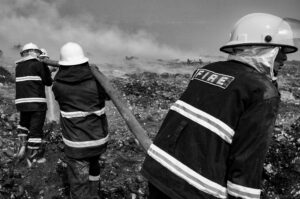The Heroic Role of Firefighters: Beyond Extinguishing Flames


Firefighters are often seen as the brave individuals who run into burning buildings when everyone else is running out. While their ability to extinguish flames is vital, the role of firefighters extends far beyond fire suppression. These men and women serve as first responders in a wide range of emergencies, from medical crises to natural disasters. Their work blends courage, technical skills, and compassion, making them indispensable pillars of public safety.
Firefighters as First Responders
When an emergency call comes in, firefighters are often the first to arrive. Whether the incident involves a fire, a vehicle accident, or a medical emergency, they are trained to take immediate action. Their presence ensures rapid stabilization of situations that could otherwise spiral out of control.
Firefighters provide critical medical support in many communities. With training as emergency medical technicians or paramedics, they deliver lifesaving interventions before patients reach the hospital. From administering CPR to controlling bleeding, their actions often mean the difference between life and death.
Search and Rescue Operations
One of the most heroic aspects of firefighting lies in search and rescue missions. Firefighters risk their lives to enter hazardous environments where others cannot. Inside burning structures, they search for trapped victims, guided only by their training and equipment. Their commitment to saving lives showcases the true meaning of bravery.
Beyond fire scenes, firefighters conduct rescues during floods, earthquakes, and severe storms. They evacuate communities, pull people from vehicles submerged in water, and save individuals stranded in collapsed buildings. Their adaptability and willingness to face danger highlight their importance during every type of disaster.
Responding to Hazardous Materials
Modern emergencies often involve more than fire and smoke. Chemical spills, gas leaks, and hazardous material accidents require specialized skills. Firefighters trained in hazardous materials response identify dangerous substances, contain leaks, and prevent environmental damage.
These situations demand precision and calm under pressure. Firefighters must wear protective gear, use specialized equipment, and follow strict safety protocols to protect both themselves and the public. Their work in this area prevents catastrophic consequences for entire communities.
Community Education and Fire Prevention
Prevention is a cornerstone of the firefighting profession. Firefighters dedicate significant time to educating the public about fire safety and prevention. Through school visits, community events, and safety drills, they teach families how to respond in emergencies and reduce risks.
Programs such as smoke alarm installations, fire extinguisher training, and evacuation planning strengthen community preparedness. Firefighters know that preventing fires and emergencies is just as important as responding to them. By spreading awareness, they reduce tragedies and build stronger, safer neighborhoods.
Emergency Medical Services
In many cities, firefighters also function as part of the emergency medical services system. They respond to heart attacks, strokes, trauma injuries, and other urgent health crises. Their training in advanced life support equips them to manage airway emergencies, administer medications, and provide defibrillation when needed.
This dual role as both firefighter and medic reflects the versatility of the profession. When seconds count, having medically trained firefighters on the scene improves outcomes and ensures patients receive immediate care.
Mental Strength and Emotional Support
Firefighters face not only physical challenges but also emotional ones. They witness tragedy, loss, and trauma daily. Despite the emotional toll, they often serve as sources of comfort for victims and families. Offering reassurance, compassion, and stability in moments of chaos is part of their duty.
Mental resilience is essential in the profession. Fire departments increasingly emphasize peer support programs, counseling, and mental health resources to help firefighters cope with the stress of their work. This focus on wellness ensures they remain strong for themselves and the communities they serve.
Firefighters in Natural Disasters
Natural disasters highlight the versatile role of firefighters. During hurricanes, wildfires, and tornadoes, they work tirelessly to rescue victims, provide medical aid, and restore safety. Their ability to adapt quickly makes them critical assets in disaster response efforts.
For instance, wildfire firefighters spend weeks on the frontlines battling massive blazes. They protect not only homes and businesses but also forests, wildlife, and infrastructure. Their endurance and bravery under extreme conditions emphasize the depth of their service to society.
Training and Continuous Learning
The scope of a firefighter’s role requires constant training. Beyond fire suppression techniques, they study emergency medicine, hazardous materials, disaster management, and rescue operations. Physical fitness is equally important, as the demands of the job require strength, stamina, and endurance.
Continuous learning ensures firefighters remain prepared for evolving threats. Advances in technology, changes in building materials, and new medical protocols all demand regular updates to their training. This commitment to lifelong learning underscores their professionalism and dedication.
The Symbol of Courage and Service
Firefighters embody a sense of duty that goes beyond individual recognition. They represent courage, service, and community spirit. Their willingness to put others’ safety ahead of their own makes them true heroes.
Communities rely on firefighters not only during emergencies but also as role models. Their dedication inspires trust and respect, reinforcing the bond between fire departments and the public.
The heroic role of firefighters extends far beyond extinguishing flames. They serve as first responders, rescuers, medics, and educators, playing a vital role in every aspect of public safety. From natural disasters to everyday emergencies, firefighters embody resilience, compassion, and bravery. Their work ensures that when crisis strikes, communities can count on someone to answer the call.
Firefighters do more than fight fires—they fight for lives, safety, and the well-being of society. Their profession is a testament to the enduring spirit of service and the extraordinary impact of ordinary people choosing to do incredible things.
